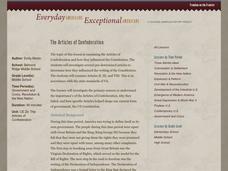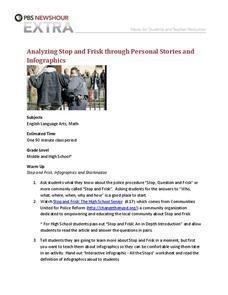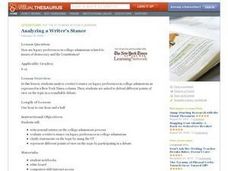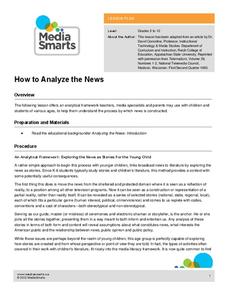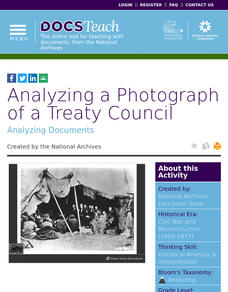Roy Rosenzweig Center for History and New Media
The Articles of Confederation
Have you ever started a project only to realize you need to scrap it and start over? Scholars analyze the issues leading to the fall of the Articles of Confederation. A group investigation into Articles II, III, and VIII unveil the...
National Endowment for the Humanities
The President Under the Articles of Confederation
The Articles of Confederation sounds like one big, fancy title to middle schoolers. Here, scaffolded steps help to ease novices into understanding this all-important American document. Discussion questions, lesson activities, and ideas...
Curated OER
SWOT Teams: Analyzing the Political Parties for the 2010 Midterm Elections
What are political parties and what so strategists do? In this political analysis lesson, students analyze political strategies to understand their strengths and weaknesses. They use key details from the text to learn how to create...
Newseum
Media Mix-Ups Through History: Analyzing Historical Sources
Scholars use the E.S.C.A.P.E. (Evidence Source, Context, Audience, Purpose, Execution) strategy to analyze a historical source to determine why mistakes happen in news stories. They then apply the same strategies to contemporary flawed...
DocsTeach
Analyzing a Petition about Slavery
Practice analyzing primary sources in a thought-provoking lesson on the impact of slavery. Young historians read a petition regarding the Fugitive Slave Law and answer a series of questions to understand the importance of the document....
National Council for the Social Studies
Analyzing a Product or Political Advertisement
How do advertisements evoke specific thoughts and feelings? Class members find out through the exploration of the Internet, videos, television, magazines, radio, and posters. Learners investigate commercial advertisements, political...
PBS
Analyzing Stop and Frisk Through Personal Stories and Infographics
How much can you learn about an important topic from a single image? High schoolers analyze an infographic that represents the number of stops performed during the Stop and Frisk police procedure. After building background information...
Newseum
Free Press Challenges Through History: Analyzing Historical Sources
The debate over the integrity of stories in media is not new. Young journalists analyze historical sources that reveal freedom of the press controversies and draw parallels to challenges freedom of the press faces today.
Brown University
Analyzing the News
With so many ways to follow the news today, it is imperative to think critically about the sources of information we are turning to. Here is a fantastic graphic organizer that will help your learners develop the skills to properly...
Curated OER
Analyzing a Writer's Stance
Should college admissions decisions be based on whether whose family members attended? Secondary students read and respond to a New York Times article on the issue of 'legacy preferences' in college admissions. Following class...
Committee for Children
Students Learn to Stop Rumors Before They Start
Two activities look at how rumors are spread and ways class members can stop them. The first activity brings forth an in-depth conversation about how reporters gather information to write articles and how students can implement the same...
National Endowment for the Humanities
The "To Do List" of the Continental Congress
What is on your to-do list today? The second lesson of a three-part series on Lost Heroes of America investigates the laundry list of items in front of the second Continental Congress. Scholars research, analyze, and present information...
Curated OER
Interpreting Foundation Documents of the American Republic
Explore early American documents that qualify as primary sources. Tenth and eleventh graders use the provided worksheets to analyze the texts of the Articles of Association, the Declaration of Independence, the Articles of Confederation,...
EngageNY
Main Ideas in Informational Text: Analyzing a Firsthand Human Rights Account for Connections to Specific Articles of the UDHR
Lesson 10 in a series of human rights lessons focuses on the skills of finding evidence and summarizing. Your young readers work to compare the two texts they have read in this unit: the Universal Declaration of Human Rights...
EngageNY
Main Ideas in Informational Text: Analyzing a Firsthand Human Rights Account
Although this is part of a series, lesson plan nine has your class take a break from their close study of the Universal Declaration of Human Rights (UDHR) text to read the firsthand account “Teaching Nepalis to Read, Plant, and Vote” by...
The New York Times
Looking for Answers: Making Sense of the Boston Marathon Bombing
How should America respond to acts of domestic terrorism? What motivates or prompts a terrorist attack? After reading an opinion piece on the 2013 Boston Marathon bombing, your learners will critically analyze factors that could have...
Curated OER
What's the News? Articles of Deception
Students choose a event in the news involving deception. In this deception instructional activity, students develop questions and share them. Students answer critical thinking questions about their event and describe what they learned...
West Virginia Department of Education
Editorials: The Guiding Voice of Authority?
How much can opinion influence a news story? A standalone resource discusses the importance of John Brown's Raid through the lens of journalism. Learners analyze two different texts, one from the perspective of the North and the other of...
Media Smarts
How to Analyze the News
Teach kids how to watch television, specifically the news, with this creative idea for learners of all ages from the Media Awareness Network. The elementary school plan focuses on presenting news as a story and uses Jon Scieszka's story...
Curated OER
Remembrance of Things Past
Engage critical and social thinking by exploring the value of language and word choice. The class considers the article "The Silence of the Historic Present" and analyzes several presidential speeches. They engage in class discussion,...
Center for History Education
The Founding Fathers and the Constitutional Struggle Over Centralized Power
Believe it or not, the Constitution was America's second attempt at a democratic government. Academics travel back to the past to explore the shortcomings of the Articles of Confederation that would eventually lead to the Constitutional...
DocsTeach
Analyzing a Photograph of a Treaty Council
A photo catches a moment in time that provides a glimpse into the past. An interesting resource focuses on historical analysis using an image from a treaty council with Native Americans. Budding historians complete an online worksheet...
DocsTeach
Analyzing Jackie Robinson's White House Letter
Jackie Robinson: A hero on and off the field. An eye-opening activity focuses on Jackie Robinson's social activism during and after the civil rights movement. Academics read a letter addressed to President Nixon, answer questions, and...
National Endowment for the Humanities
Lesson 4 James Madison: Internal Improvements Balancing Act—Federal/State and Executive/Legislative
Who has the power? The founding fathers asked the same question when the United States was formed. Learners explore issues that arose during Madison’s presidency that raised constitutional questions. Through discovery, discussion, and...


